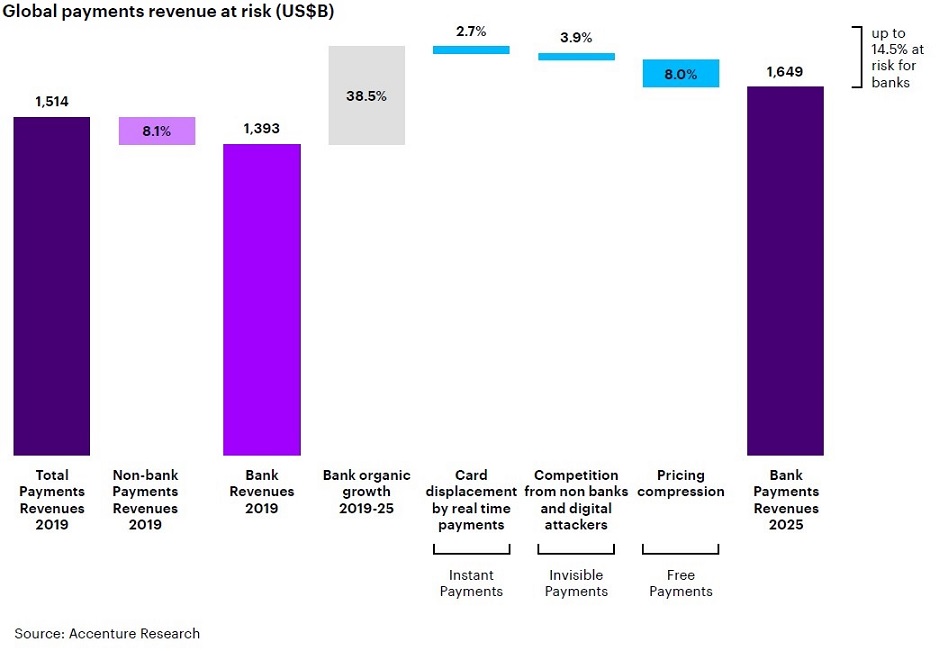
Yet, as digital payments continue to grow, banks can tap into US$500 billion opportunity in new payments revenue if they adopt innovative business models.
As much as 15% of banks’ global payments revenue, or US$280 billion, is likely be displaced by the growth of digital payments and competition from non-banks, as payments become more instant, invisible and free, according to a new report from Accenture.
The report found that global payments revenue will likely grow at an annual rate of 5.5%, from US$1.5 trillion in 2019 to more than US$2 trillion by 2025. Only banks that change their business models to adopt the latest technologies and focus on providing value-added services to customers will capture a share of the US$500 billion in incremental revenue growth.

Titled “Banking Pulse Survey: Two Ways To Win,” the report is based on a revenue-risk analysis model that Accenture developed to measure trends in how consumers pay and projected changes in merchant behavior, technology and regulation. The research is complemented by a survey of 240 payments executives at banks across 22 countries to determine how they plan to mitigate and capitalize on the disruption in payments to grow customer loyalty, revenues and profitability.
“Rather than being at the forefront of the new wave of the booming payments market, banks are feeling the heat from new competition and seeing their margins squeezed,” said Gareth Wilson, Accenture’s global payments lead. “We face an inevitable world of instant, invisible and free payments, which spells trouble for banks that don’t want to be relegated to the plumbing of payments. But it also presents an opportunity to tap into a new business model based on this digital boom.”
The report notes that over the next six years, banks will face further pressure on income from card transactions and fees, with free payments putting 8% of payments revenue at risk. In addition, competition from non-banks in invisible payments — where payments are completed in a ‘virtual wallet’ on a mobile app or device — will put 3.9% of bank revenues at risk. Card displacement by instant payments, where funds are settled and transferred in real-time and banks make little to no interest, is projected to put an additional 2.7% of payment revenues at risk.
This builds on current declines in income from card transactions and fees, with regulation triggering fee compression and technology displacing the role of banks in payments. Already between 2015 and 2018, revenue from business customer credit card transactions dropped 33%, revenue from consumer debit card transactions dropped nearly 15%, and revenue from credit cards dropped almost 12%.
The research found that the industry is aware of the challenges posed by new technologies in payments. More than two-thirds (71%) of the banking executives surveyed agree that payments are becoming free; nearly three-quarters (73%) believe that most payments are already invisible or will become so over the next 12 months; and even more (78%) said that payments are either already instant or will become instant over the next 12 months.
“The digital boom will mean banks have to fundamentally change the way they think about their revenue composition,” said Alan McIntyre, who leads Accenture’s Banking practice globally. “Channels that once made the banks billions of dollars will cease to exist. To succeed in the future, banks will need to develop new digital business models at scale, with ‘one-click’ payments the new norm, and set their sights on delivering secure, convenient and frictionless customer experiences.”
In response to these key market challenges, nearly four-in-five (18%) respondents said the main priority for the bank is to build security into retail payments transactions. Nearly one-quarter (22%) cited artificial intelligence, robotics, machine learning and innovative payments hubs as the key platform technology capabilities they need to adapt their core systems to high-speed and continuous payment flows.
About the Accenture 2019 Global Payments Survey
Accenture conducted an online survey of 240 retail and corporate payments executives globally from the largest banks in the following countries: Australia, Brazil, Canada, China (mainland and Hong Kong), Denmark, Finland, France, Germany, India, Indonesia, Italy, Japan, Malaysia, Mexico, Norway, Singapore, Spain, Sweden, Thailand, United Arab Emirates, the United Kingdom and the United States. The survey was conducted between Feb. 14 and March 10, 2019. The overall margin of error is +/- 1.55 percentage points at the midpoint of the 95th percentile confidence level.
Banking 4.0 – „how was the experience for you”
„To be honest I think that Sinaia, your conference, is much better then Davos.”
Many more interesting quotes in the video below: